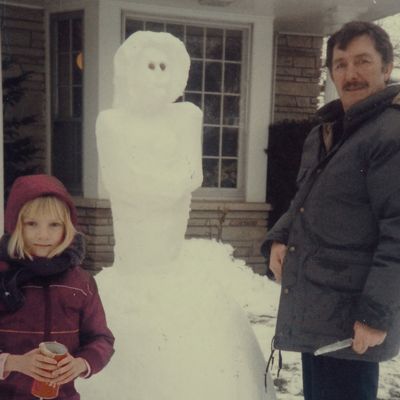
Sarah Polley’s nervous, whimsical documentary Stories We Tell is further proof that this gifted actress and possibly more gifted writer-director does nothing easy — and might even have a compulsion to make things harder than they need to be.
The film centers on Polley’s mom, Diane, who died 23 years ago (Sarah was 11) and maybe had an affair that maybe produced Sarah. As painful odysseys go, this one’s relatively straightforward: Did Diane or didn’t Diane? Let’s have a look at the DNA … But in a blog post published on the National Film Board of Canada website the day of the movie’s Venice debut, Polley confessed that “personal” documentaries make her squeamish: “I’ve seen some brilliant ones,” she wrote, “but they often push the boundaries of narcissism, and can feel more like a form of therapy than actual filmmaking.” More fascinating to her was the way her mother’s story changed depending on who was doing the telling: “So I decided to make a film about our need to tell stories, to own our stories, to understand them, and to have them heard.”
So Polley has gone meta — exuberantly, entertainingly, with all her heart. She opens Stories We Tell with a quote from fellow Canadian Margaret Atwood’s Alias Grace, which she’s not so incidentally adapting for the screen: “When you are in the middle of a story it isn’t a story at all, but only a confusion … It’s only afterwards it becomes anything like a story at all.” This quasi-story’s quasi-narrator is Sarah’s father, a transplanted British actor named Michael, who is not only seen but seen being directed by Sarah, who occasionally has him re-read more delicate passages about his wife’s infidelity. “What do you think of this documentary being made?” She asks each of her siblings in turn. “Are you nervous?” “A little.” “It’s going to get worse.” It does get testy with one of Polley’s brothers, who evinces surprise bordering on indignation that Diane didn’t abort her final child. “Thanks,” says Sarah, off camera.
A producer named Harry Gulkin, with whom Diane spent time in the seventies (when she briefly left her family in Toronto to appear in a play in Montreal), tells Sarah that he rejects any version of events that isn’t his. He says he needs to “control the story.” But so does Michael, who turns out to have written the narration he has been reading, and in which he refers to himself in the third person. Toward the end of Stories We Tell, Polley holds on each of her subjects for a few beats, alone with his or her private memory, his or her “truth.”
Between talking heads, there’s a lot of home-movie footage — of Diane, Michael, the many kids, and Gulkin in Montreal. It’s amazing how much material Polley has access to given the cost of Super 8 film and relative absence of small home video cameras in the sixties, seventies, and eighties: These showbiz types must really have liked being photographed all the time! Polley’s footage is so splendidly illustrative (down to tiny glances between Diane and the man who might be Sarah’s biological father) that you can even be forgiven for wondering if it’s fake. But then you realize it can’t possibly be fake. No actors could look as much like the younger versions of their real-life counterparts. You can see — unmistakably — Sarah’s features in those of her on-screen mother. Besides, Polley would have to inform us that these were reenactments, wouldn’t she? Isn’t that what documentary means? (Pssst — it’s fake.)
The meaning of documentary is extraordinarily fluid these days, of course, and by calling it so stylishly into question, Polley has earned a lot of affection from critics, festival-goers, and even fellow documentarians. Stories We Tell supplies a lot of talking points in the battle against the so-called truth of individual memory. But from my singular perspective, all this doc-consciousness has absolutely nothing to do with the story of Diane Polley. This is actually a rare instance in which multiple perspectives dovetail neatly, in which there’s almost no ambiguity whatsoever about what happened and why. Polley didn’t have to go all meta on us to justify our attention.
But I suppose she wouldn’t be Polley if she didn’t — and now that I know that she’s (sort-of spoiler coming) half Jewish, I wonder if it’s not in her genes to try to mess up the seemingly orderly Wasp society into which she was born. In the eighties, she famously bullied her mom into putting her in showbiz, and then, when her teen stardom was assured, rebelled against Disney by showing up at a promotional event during the first Gulf War with a peace necklace. She got a couple of teeth knocked out during a protest. She dropped out of Cameron Crowe’s Almost Famous, probably because the role of the beatific groupie Penny Lane was too much of a passive waif. She was more in her element in Go, in which she was so pointedly, punkishly unlikable that many of us fell in love with her on the spot. Her accomplished first feature as a writer and director, Away From Her, was suffused with helplessness and ambivalence. Her second, Take This Waltz, was a leap forward in technique: This time the emotional ambivalence was right there in the filmmaking.
But does all that ambivalence — for which another word is drama — belong in her first documentary in this fashion? I suspect that Polley was so bent on not seeming narcissistic (or exploitative of her family’s privacy) that she didn’t explore the effect on her of her parents’ irresolute marriage. She didn’t explore what it meant for her to grow up with a dad who wasn’t the least bit like her. The one story that Stories We Tell doesn’t tell is hers.
This review originally appeared in the May 6 issue of New York magazine.





